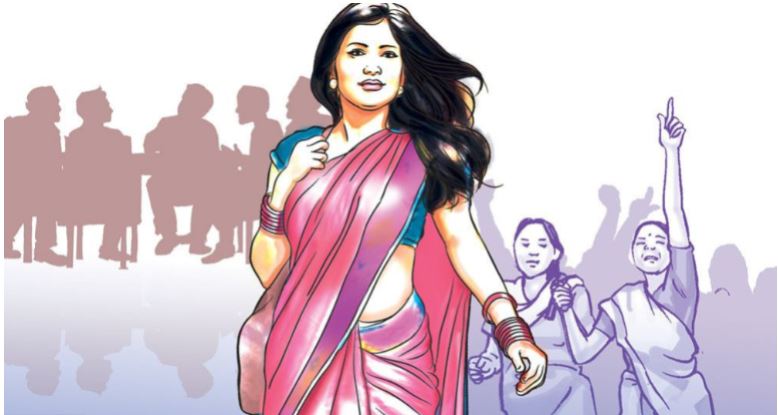
Kathmandu: “We have learned what it means to be a woman, and more importantly, what it means to be a woman who holds the power to redefine the traditional definitions of equality and feminism tainted by the patriarchal imprints in our society.”
Whenever Priyanjali Karn, 22, hailing from Janakpur, articulated these words from the podium to a packed hall, her parents as audiences seemed delighted to listen to their daughter who as they said was quite different until eight months ago.
Priyanjali’s mother Subha Suhasini, 52, said she has now realized that her daughter is moving ahead and is doing better day by day.
Her father Satyandralal Karn who is a head teacher at the Kalimati-based Jana Prabhat Secondary School has found that these days his daughter is “more social, expressive, and extra confident in public speaking”. “Eight months ago, she was not like this.”
Priyanjali’s father said though it was the desire of the family that Priyanjali would pursue a career in the technical field, now the family fully supports her dream of becoming a teacher, with a ‘determination’ to do something for the cause of women from her community and catalyze social change. “Now her choice is ours.”
Priyanjali, the daughter of Madhesh, was among those 18 girls representing diverse castes and communities who graduated upon the completion of the Young Women’s Political Leadership Course (YWPLC)-2023/24 programme launched by Women LEAD Nepal.
She is the recipient of the “Most Growth Award” of her batch. She shared that during her visit to the Madhesh Province in the connection with the course, she realized that Madheshi women face significant challenges including in education and she feels a personal responsibility to uplift them educationally.
The graduation ceremony for participants of both the YWPL Course and the comprehensive year-long “Lead Course” was held in the capital on Saturday, organized by Women LEAD.
Priyanjali shared that as the starter of the YWLP course she was scared and nervous, unsure of what lay ahead. “I held onto a hidden sense of helplessness and disappointment at why women are still looked down upon. I was even more scared to ask questions, fearing my lack of knowledge would be exposed.
“But what a beautiful journey these eight months have been. A journey of learning, unlearning, understanding, internalizing, and searching for hope in where we stand and what we must question,” she said confidently.
Ranjana Ramtel, 18, from Sindhupalchwok, is the winner of the “Most Growth Award” of the Lead Course 2023/24 featuring 27 Grade among 12 young women in Nepal.
“Lead Course was the turning point of my life that allowed me to know myself better. It introduced me to women’s leadership, and I learned the skills I had missed out on 18 years of my life. Some valuable skills I learned during the Lead Course were public speaking, leadership, active listening, time management, civic engagement, etc. I also learned to engage in social issues and work as a change-maker,” she elucidated.
A management student, Ramtel has now set her sights on becoming a leader in society over the next decade.
Her mother, Maiya Ramtel, 41, traveled to the federal capital specifically to attend her daughter’s graduation ceremony. She was amazed to witness the “transformations” in her daughter over the past year. Maiya expressed her hopes that her daughter will dedicate her time to fostering social transformation, combating discrimination, and standing firmly for her beliefs.
According to Women Lead Nepal’s Executive Director Hima Bista, the Lead Course is designed to empower grade 12 young women with a deep understanding of leadership styles and personal strengths, with a focus on building confidence, communication skills, and resilience. Lead Course equips young women with the tools and support they need to become influential leaders and advocates for change in Nepal.
The YWPLC targeted for women aged 18-25 aims to empower participants with a foundation knowledge of Nepal’s democratic system and political processes. It equips them with essential professional skills required in political organization and fostering an understanding of the importance of intersectionality and women in politics/leadership, she added.
Lawmaker Toshima Karki, who was there to inspire the graduates and witness the graduation ceremony, insisted on the need for meaningful representation and meaningful leadership of women in each State apparatus. She viewed that the journey of women’s empowerment would remain incomplete until women were economically empowered.
She hoped that those young girls and women who graduated today would significantly contribute to shaping the future of women’s leadership. Parliamentarian Karki urged the participants to add something else to their skills so that they could claim their roles and leadership in diverse sectors of society.
FACEBOOK COMMENTS